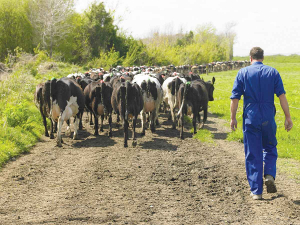Moving animals, farms come with key responsibilities
Moving farms or relocating your herd to a new place comes with important responsibilities as a PICA (Person in Charge of Animals) in the NAIT system.
 Waikato Regional Council says planning is necessary when it comes to preventing pest plant spread and ensuring effluent doesn’t enter waterways.
Waikato Regional Council says planning is necessary when it comes to preventing pest plant spread and ensuring effluent doesn’t enter waterways.
Waikato Regional Council is reminding farmers to ensure machinery, vehicles and equipment are cleaned ahead of Moving Day.
The Council says planning is necessary when if comes to preventing pest plant spread and ensuring effluent doesn’t enter waterways.
“Through good on-farm biosecurity practices, farmers and contractors can make a massive difference to preventing the spread of pest plants and weeds,” says regional council biosecurity pest plants team leader, Darion Embling.
“Unclean machinery is a confirmed pathway for the spread of infestations, such as velvetleaf and alligator weed, between some farms in our region. That makes machinery hygiene especially important with Moving Day coming up and the mass movement of stock, machines and vehicles between farms.”
Embling says machinery hygiene must be practiced any time a machine is moved between properties.
“Any form of plant or soil contamination has a real potential for harbouring pests or weeds. Machinery should be cleaned so no visible soil or plant matter remains,” he says.
Ideally, machinery washdown should occur on the property prior to movement, containing any problems at the source. Alternatively, machinery can be cleaned in a built-for-purpose washdown facility, but care should be taken to ensure there is not a risk of pest spread during transport to that facility.
“Pest plants such as alligator weed and velvetleaf can have a massive impact on the productivity and profitability of farm businesses, so farmers and contractors need to be extra vigilant when moving between properties,” says Embling.
Farmers are also reminded to stand stock off green feed before they’re walked or transported to prevent effluent entering waterways and help keep the region’s roads clear of discharge and safe for users.
A cow’s daily combined effluent is approximately 52 litres, and a truck effluent tank’s capacity is just 200 litres. It means the spillage of effluent onto roads is a real risk unless farmers in particular take some simple steps ahead of time.
The regional council recommends that farmers:
use dry feed before transport because it results in less effluent.
South Waikato farm manager Ben Purua’s amazing transformation from gang life to milking cows was rewarded with the Ahuwhenua Young Maori Farmer award last night.
Bankers have been making record profits in the last few years, but those aren’t the only records they’ve been breaking, says Federated Farmers vice president Richard McIntyre.
The 2023-24 season has been a roller coaster ride for Waikato dairy farmers, according to Federated Farmers dairy section chair, Mathew Zonderop.
Ministry for Primary Industries (MPI) director general Ray Smith says job cuts announced this morning will not impact the way the Ministry is organised or merge business units.
Scales Corporation is acquiring a number of orchard assets from Bostock Group.
Family and solidarity shone through at the 75 years of Ferdon sale in Otorohanga last month.

OPINION: This old mutt well remembers the wailing, whining and gnashing of teeth by former West Coast MP and Labour…
OPINION: Your canine crusader gets a little fed up with the some in media, union hacks, opposition politicians and hard-core…